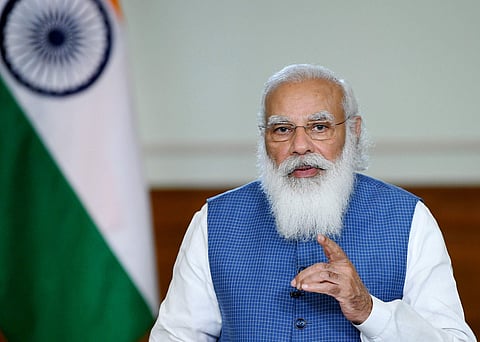

Prime Minister Narendra Modi batted for developing a hybrid system of online and offline learning so that overexposure of school children to technology can be avoided. He expressed these and many more thoughts while charing a high-level review meeting for the implementation of the National Education Policy (NEP).
As per an official statement, NEP is being rolled out with the objectives of access, equity, inclusivity and quality, he informed.
The Prime Minister laid emphasis on indigenously developed toys, using which, students' conceptual skills need to be developed. He also offered the suggestion that secondary schools with science labs should engage with farmers in their area for soil testing, the statement said, as per a report in PTI.
He proceeded to applaud the policy and informed that concentrated efforts are being made to track children who are out of school so that they can be brought back into the mainstream. As the country enters the Amrit Kaal, transformative reforms like multiple entry and exit in higher education have been introduced, he said.
The Prime Minister was apprised that the formulation of the National Curriculum Framework under the guidance of the National Steering Committee is in progress.
When it comes to school education, there are certain initiatives that are being adopted to ensure better learning outcomes and the holistic development of children. These initiatives include ECCE in 'Balavatika', NIPUN Bharat, Vidya Pravesh, examination reforms and innovative pedagogies like art-integrated education, toy-based pedagogy and more. This was informed by the statement.
In reference to multi-disciplinarity in higher education, it also added that the PM was informed of the guidelines for multiple entry-exit for flexibility and lifelong learning along with the launch of the academic bank of credit on digilocker platform will ensure that students can study at their convenience and choice.
The UGC (University Grants Commission) had published guidelines, as per which, students will be free to pursue two academic programmes together. This was done to create new possibilities and is a step towards life-long learning.
The National Higher Education Qualification Framework (NHEQF) is at an advanced stage of preparation plus, UGC is revising the existing Curriculum Framework and Credit System for Undergraduate Programme in sync with the NHEQF, the statement mentioned.
As many as 2,774 innovation councils have been set up in higher education institutions in 28 states and six union territories; the Atal Ranking of Institutions on Innovation Achievement (ARIIA) was launched in December last year plus, online, open and multi-modal learning have been promoted by schools and higher education institutes.
This initiative has helped in reducing the learning loss due to the COVID-19 pandemic and will contribute to ensure that education reaches remote and inaccessible parts of the country, it said.
Swayam, Diksha, Swayam Prabha, Virtual Labs and other online resource portals have all seen a sharp rise in traffic and student registrations. These portals are providing study materials in multiple Indian languages, sign language and in audio formats for the visually impaired, it said.
In addition to the above, the UGC has notified Open and Distance Learning (ODL) and Online Programmes Regulations under which 59 higher educational institutions are offering 351 full-fledged online programmes and 86 higher education institutions are offering 1,081 ODL programmes.
The permissible limit of online content in a programme has also been raised to 40 per cent, it said.
It added that stress has also been given to multi-linguality in education and testing to ensure that lack of English knowledge does not impede the educational attainment of any student.
With this objective in mind, states are publishing bilingual and trilingual textbooks at the foundational level and content on DIKSHA platform has been made available in 33 Indian languages.
The NIOS has introduced Indian Sign Language (ISL) as a language subject at the secondary level.
Technical book writing is being undertaken in Hindi, Marathi, Bengali, Tamil, Telugu and Kannada, it said, adding that Engineering courses are being offered in six Indian languages in 19 engineering colleges across 10 states from 2021-22.
